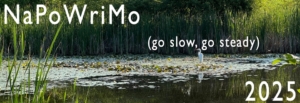OUBLIETTES OF LIGHT, Lisa Ashley. MoonPath Press, P.O. Box 445, Tillamook, OR 27142, 2025, 73 pages, 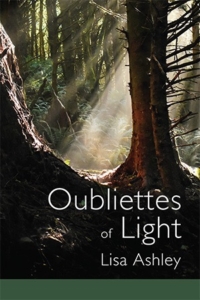 $17.99, paper, http://MoonPathPress.com.
$17.99, paper, http://MoonPathPress.com.
What a pleasure for me to begin National Poetry Month with a blog-review of Lisa Ashley’s debut book of poetry, Oubliettes of Light.
An oubliette is a secret dungeon, accessible only through a trapdoor at the top. In these poems, we encounter multiple trapdoors, and we drop through them into dark, painful histories: the Armenian genocide, fragmented stories of violence handed down through the generations (along with family recipes, and a thirst for survival). A father provides for his family, and bullies and abuses his wife and children. A mother escapes into her flower garden, and into a bottle of Scotch. Lisa Ashley, the middle child of seven, escapes the family home in rural New York State, makes her way West, finds love and motherhood, becomes a chaplain working with incarcerated youth.
And, lucky for us, she eventually finds her way to poetry.
In my attempt to capture Ashley’s book in a quick paragraph, I had to ask myself, what makes me love this book? Why would I call it a pleasure? Why will anyone else love these poems? Let me walk you through my thought process. Consider these lines opening the first poem, “Grandmother’s Story Stone”:
I know no Armenian, she no English.
Like a pupil at attention, she sits
in her straight chair by the cookstove,
shuffles pages back to front
in her Armenian Bible. She mutters,
gnarled fingers rowing.
Several lines later we get our first glimpse of the poet: “I whisper behind my hand / scubbity, scubbity, scubbity.” How else to translate an incomprehensible past? What do you hear: scubbity. What do you see: “cotton stockings [as they] sloop / into ankle bracelets.” What do you smell: “garlic, olive oil, mint, her perfume.”
Above all, these are poems of witness. Necessary to the times we live in.
But, importantly, the poems in Oubliettes of Light are not trapdoors one falls through into darkness, they are not about trauma. These poems are about healing from trauma. They are about the solace one finds in a well-lived maturity. Not dungeons, but the unexpected doors opening above us into light. A child and a young adult taking in all that happens around her and processing it; a woman on a spiritual path of awareness and reclamation.
I Went Out to Hear
after Leila Chatti
I went out to hear
birdsong. Layered
in springtime air like icing
on cake sweet
clamor of joy,
praise song to life.
I hear the undertow of bees,
find one dancing
on the poppy’s green ball
in the arms of ivory pistils,
lavender petals ten times the bee’s size
wave a Victorian fan flirtation.
Standing stock still, eyes locked,
knees heavy with pollen, I’m lost,
beat fevered wings
willing to work
this singular moment forever.
—Lisa Ashley
Years of work—personal work on herself, and work on the poetry—went into the making of this book. It shows on every page. Because I know how late she came to poetry, and how seriously she has taken it, I asked Lisa to describe her writing journey. This is what she wrote back (with her permission, I have lightly edited and shortened it) — it’s a blueprint for the later-in-life poet:
I was 60 years old when I crossed the threshold from prose writing (journalism, marketing, academic papers, sermons) to poetry writing. I was an absolute neophyte. My fundamental love of learning was my ally. It was like finding a secret, enormous treasure trove. I had never studied poetry in college. I had never read poetry in any serious way. I was familiar with Mary Oliver’s work because her poems were used so often in Unitarian Universalist services that folks in the congregations referred to themselves as the “Church of Mary Oliver.” I liked her work and the few poets I had come across in the past: Robert Frost, Emily Dickinson, Shakespeare. I had no grounding in how to read and appreciate poetry, although I felt drawn to it. In 2014, after a sermon, a congregant invited me to come to her writing group. I knew her to be a kind person so I went. From there I began to take online classes and workshops, taught by excellent poets including Ellen Bass, Jane Hirshfield, Dorianne Laux, James Crews and Danusha Laméris. I joined a newly formed workshop group on Bainbridge and subscribed to on-line poetry venues that delivered a poem daily to my inbox. I was eager to learn as much as I could. I wrote many poems and began to submit to journals. I published my first poem in 2019. In May 2024 I submitted my manuscript to MoonPath Press, to the Sally Albiso Award contest. I was a finalist and was chosen for publication. I continue to read poetry every day, listen to poetry podcasts, and have committed to writing a poem a day for National Poetry Month. You could say I approach poetry as an immersive experience, and write poems to explore who I am, and to heal.
In closing, this is an inspiring book, open-hearted and encouraging.
You can find Oubliettes of Light at MoonPath, or through Bookshop.org. To see Lisa’s brand new (and lovely) web site, follow this link: https://www.lisaashleypoet.com.
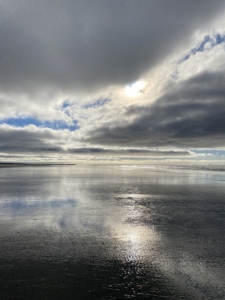
 and it is curve as in the trajectory of a life. A woman remembering her mother’s body as she anticipates the birth of her own child. A woman with small children. A woman whose grown son sleeps upstairs. A brother, surfing a wave. A blue and white bowl. Weaving throughout, the loss of the mother and grandmother. Weaving through all the other poems, the poignant grief and sweetness of making jam on a stove top, as one’s mother once, conjuring memories that curl (and curve) in the room along with the aroma, “the taste of blackberries, the reticence of grace” (“Grief”).
and it is curve as in the trajectory of a life. A woman remembering her mother’s body as she anticipates the birth of her own child. A woman with small children. A woman whose grown son sleeps upstairs. A brother, surfing a wave. A blue and white bowl. Weaving throughout, the loss of the mother and grandmother. Weaving through all the other poems, the poignant grief and sweetness of making jam on a stove top, as one’s mother once, conjuring memories that curl (and curve) in the room along with the aroma, “the taste of blackberries, the reticence of grace” (“Grief”).


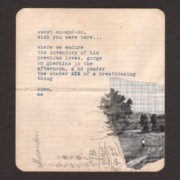
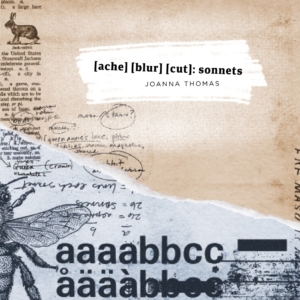
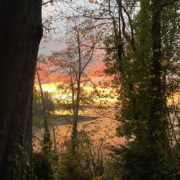
 $17.99, paper,
$17.99, paper, 
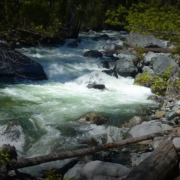
 I’m not pushing myself to do the usual blog reviews (though some may ensue), just this: one book, one poem.
I’m not pushing myself to do the usual blog reviews (though some may ensue), just this: one book, one poem.